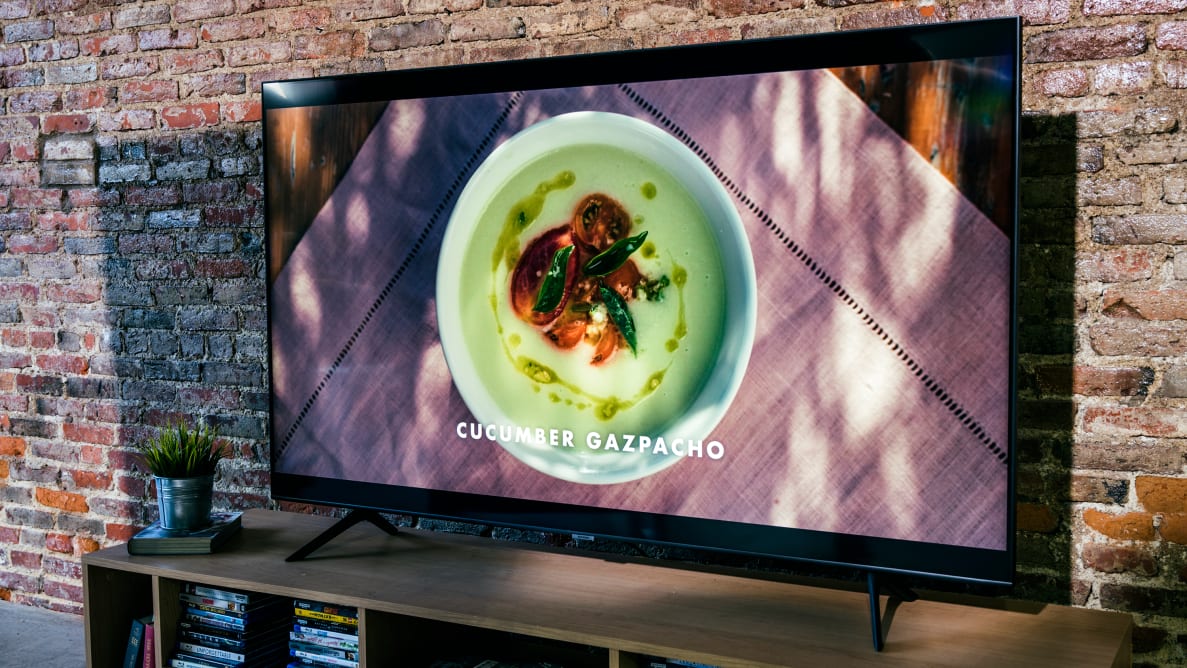Pros
-
Great value
-
Quantum dot color
Cons
-
Doesn't get very bright despite the quantum dots
Typically, TVs that harness quantum dots—"QLED" TVs, as they're often called—offer top-shelf performance for top-shelf prices. As time goes on, however, more TVs like the Samsung Q60T come to market, offering a taste of quantum dot performance for a budget-friendly cost that most of us can justify.
With that in mind, the Q60T is a fantastic, value-packed TV with significant upside. It's important to keep in mind, however, that the addition of quantum dots on their own does not guarantee the level of performance most of us have come to expect when we see the term "QLED." For all of its upside, the Samsung Q60T is still a mid-range TV with mid-range limitations.
That said, if you calibrate your expectations, you might find it easy to look past the Q60T's shortcomings: namely, a lack of brightness and subpar motion handling. If a value-packed TV is what you seek, you could do much worse than the Samsung Q60T.
(Note: Due to COVID-19 complications, this review leans heavily on test results in lieu of hands-on time with the TV.)
About the Samsung Q60T QLED TV Series
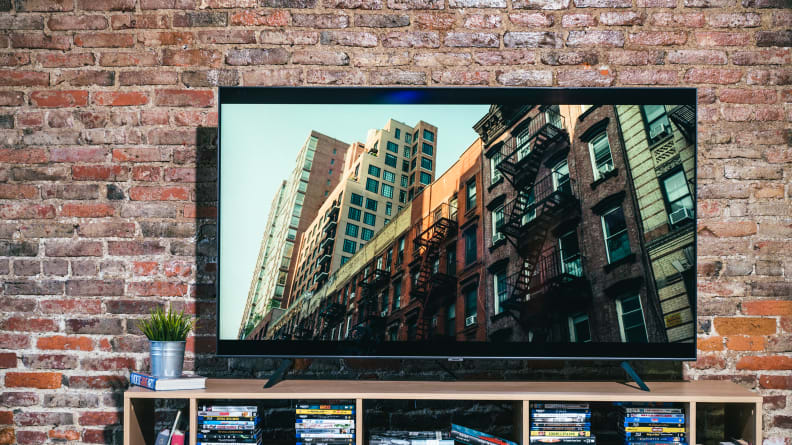
Most content will look great on the Q60T, be it SDR or HDR.
The Samsung Q60T is available in seven screen sizes, from 43 inches all the way up to 85 inches. We purchased a 65-inch version of the Samsung Q60T for our review, but here’s a rundown of every size in the series and their respective prices:
- 43-inch (Samsung QN43Q60TAFXZA), MSRP $529.99
- 50-inch (Samsung QN50Q60TAFXZA), MSRP $649.99
- 55-inch (Samsung QN55Q60TAFXZA), MSRP $699.99
- 58-inch (Samsung QN58Q60TAFXZA), MSRP $799.99
- 65-inch (Samsung QN65Q60TAFXZA), MSRP $949.99
- 75-inch (Samsung QN75Q60TAFXZA), MSRP $1,499.99
- 85-inch (Samsung QN85Q60TAFXZA), MSRP $2,499.99
Different sizes of TVs in a series tend to perform very similarly to one another, except in cases where there are significant variations in each model’s hardware. We don’t expect there to be any noteworthy differences in performance from one size of the Samsung Q60T to another. Here's a rundown of what you're getting with the Samsung Q60T, regardless of which screen size you opt for:
- 4K (3,840 x 2,160) resolution
- Quantum dot display technology
- Supports High Dynamic Range (HDR10, HDR10+, and HLG)
- Native 60 Hz refresh rate
- Samsung Tizen smart platform
- DCI-P3/10-bit color space
Like all Samsung TVs, the Q60T features a built-in smart platform powered by Tizen.
Connectivity
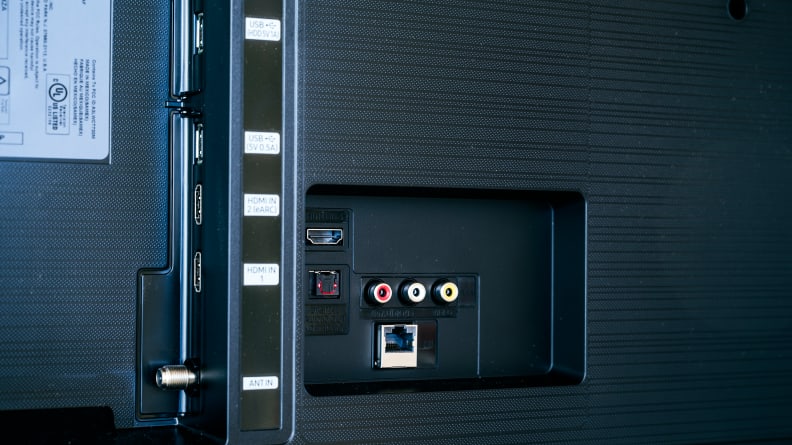
The Samsung Q60T is equipped with a standard collection of inputs that should be adequate for most viewers but somewhat lacking for serious AV enthusiasts. Here's what you'll find on the back of the Q60T’s panel:
• 4x HDMI 2.1 (1x ARC) ports • 2x USB 2.0 ports • Composite input • LAN ethernet port, RF input, optical audio output
What We Like
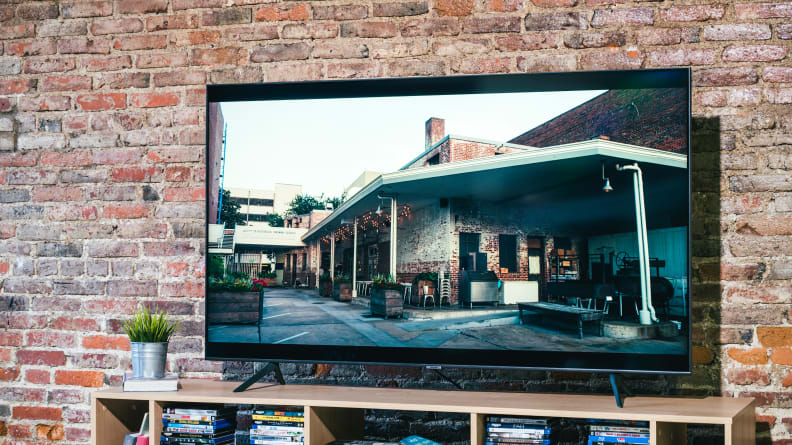
The Q60T features terrific contrast for an edge-lit LED TV with no local dimming.
Excellent contrast
Like most of Samsung's mid-range offerings in recent years, the Q60T doles out terrific contrast without the added benefits of full-array local dimming. So while the Q60T lacks the ability to brighten and darken specific zones of the picture depending on content, users will nevertheless enjoy rich black levels coupled with considerably bright highlights. As I'll explain later on, the Q60T doesn't get as bright as some of the higher-end QLED TVs on the market, but in terms of sheer usability, its contrast is plenty good.
For movies, basic cable programming, sports, or gaming, the Samsung Q60T's contrast is more than adequate—especially for an edge-lit TV with no local dimming software in tow. It doesn't get as bright as the inclusion of its quantum dots would suggest, but I'll expand more on that soon.
Quantum dot color with an affordable price tag
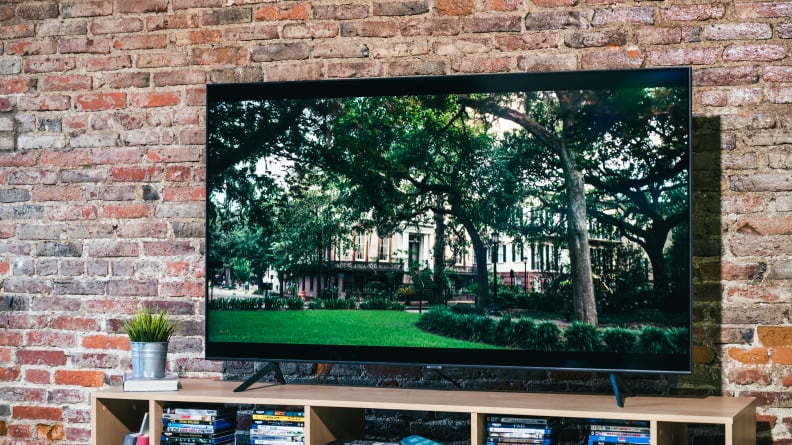
Rich, vivid color production is one of the Q60T's performance strengths.
The Q60T might not produce colors as dazzling as those found on higher-end QLED TVs further up the food chain, but its color production is nevertheless impressive. For folks who're looking for rich, voluminous color in their picture, the Q60T offers above-average coverage of the expanded P3 color space (which qualifies most HDR-mastered content) and will satisfy both casual viewers and those with well-trained eyes.
Samsung's design is easy on the eyes
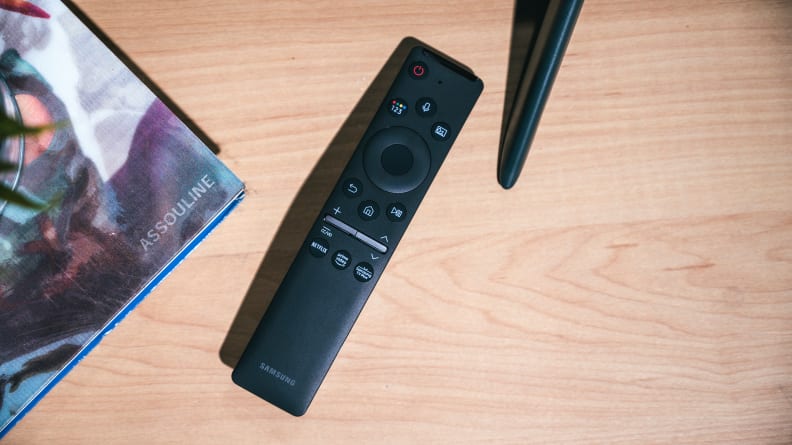
If you've encountered a Samsung TV in recent years, you'll be very familiar with the Q60T's remote control.
From top to bottom, the Samsung Q60T isn't the most posh looking TV, but it's stylish enough to live in any room and to look good doing it. The panel features ultra-thin bezels propped up by two wide-set angular feet which keeps the focus on its picture.
The Q60T's remote control will look familiar to those who've encountered a Samsung TV in the last few years: It's a narrow wand with a handful of buttons (enough to cover the essential functions) and it feels great to use, which is pretty much all you can ask for when it comes to your TV's included remote.
What We Don’t Like
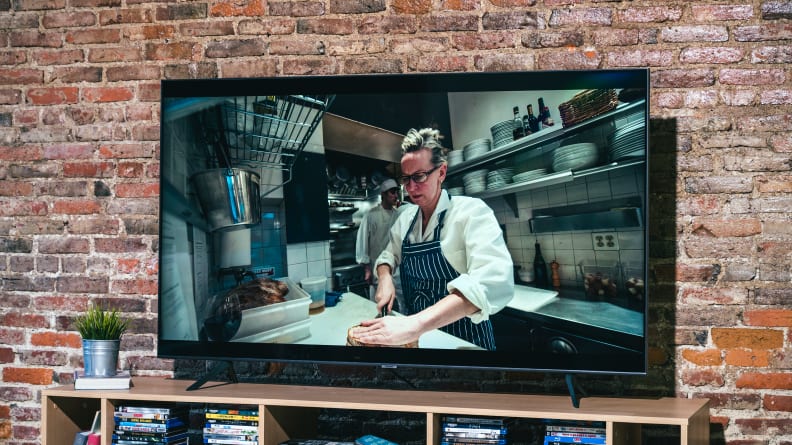
The Q60T's peak brightness levels are not as bright as you'll find on higher-end QLED TVs.
Doesn't get as bright as you'd expect
Being a mid-range TV, we weren't expecting the Q60T to get as bright as some of the more premium, high-end QLED TVs that come through our lab, but despite these reservations, the Q60T's peak brightness levels clocked in lower than we anticipated.
If you are at all concerned with the amount of ambient light in whichever room you're going to place your new TV, you might want to explore some of the higher-end options in the category of quantum dot TVs. As I mentioned previously, the Q60T's overall contrast is great, but folks expecting the sort of sizzling highlights that typically come with quantum dot panels should temper their expectations.
Subpar motion handling
The Samsung Q60T offers a robust experience that punches well above its weight class for most categories, but folks who desire the smoothest possible motion handling—for gaming or otherwise—might want to take a look at a TV with a native 120 Hz refresh rate. The Q60T is a 60-Hz TV, which makes it less than ideal for high-framerate content or fast-moving content. Samsung offers a suite of motion enhancement tools ("LED Clear Motion" for optional black frame insertion) but the Q60T only offers motion interpolation for up to 30 FPS.
Should You Buy It?
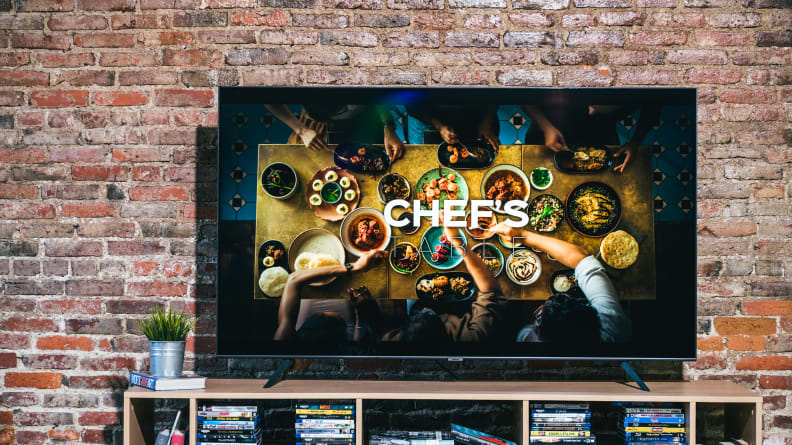
The Samsung Q60T is a great entry-level QLED TV, but you should shop around in this category before making a purchase.
Yes—but be sure to shop around first
The Samsung Q60T is a fantastic, value-packed TV, but it faces stiff competition from TVs like the 2019 Vizio M Series Quantum and the 2019 TCL 6-Series, which are both superb quantum dot TVs in their own right. Additionally, there are two new Vizio M Series Quantum lined up for 2020 that we haven't yet reviewed, and from the looks of it, these new M Series models will be giving the Q60T a run for its money—in both the price and performance categories.
This isn't to say that the Q60T isn't worth a look—quite the contrary. Some folks might consider Samsung's Tizen-powered smart platform to be their preferred experience, and others might appreciate Samsung's design elements. If what you're looking for is a TV that emphasizes value without cutting every possible corner, the Q60T is worthy of consideration. It just so happens that a handful of other TVs are just as worthy.
Meet the testers
Michael Desjardin graduated from Emerson College after having studied media production and screenwriting. He specializes in tech for Reviewed, but also loves film criticism, weird ambient music, cooking, and food in general.
Julia is the Senior Scientist at Reviewed, which means that she oversees (and continually updates) the testing of products in Reviewed's core categories such as televisions, washing machines, refrigerators, and more. She also determines the testing methods and standards for Reviewed's "The Best Right Now" articles.
Checking our work.
Our team is here to help you buy the best stuff and love what you own. Our writers, editors, and experts obsess over the products we cover to make sure you're confident and satisfied. Have a different opinion about something we recommend? Email us and we'll compare notes.
Shoot us an email